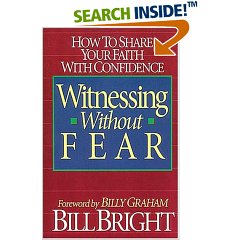 (These tips are from the book Witnessing Without Fear by Bill Bright. I don't agree with everything in the book--Bright seems to imply you can lead almost anyone to Chirst if you just expain the Good News properly--but overall it's a very helpful resource.)
(These tips are from the book Witnessing Without Fear by Bill Bright. I don't agree with everything in the book--Bright seems to imply you can lead almost anyone to Chirst if you just expain the Good News properly--but overall it's a very helpful resource.)When sharing the Gospel, you will find that people have many reasons for dismissing the Bible or Christianity, and a few individuals are downright hostile to the faith. But you don't have to be intimidated by these responses. A loving, respectful attitude on your part can go a long way toward disarming critics and reducing conflicts. The Bible commands us to share the hope of the gospel "with gentleness and respect" (1 Peter 3:15), for "A gentle answer turns away wrath" (Proverbs 15:1).
Some Basic Principles:
1. Never Argue.Remember, your job is to share the Gospel, not win an argument. What good is wining an argument if you lose a soul?
2. Don't try to reason within the listener's sphere of expertise.You can't know everything. If you try and argue philosophy with a philosopher or science with a scientist, you will probably lose. Keep bringing the conversation back to what you know: Jesus and the Gospel.
3. Remember what God has commissioned you to do.Your job is to proclaim; it is God's job to convert. You do not have to win a convert in order to have a successful encounter. Successful witnessing is simply taking the initiative to share Christ in the power of the Holy Spirit, and leaving the results to God.
4. Try to move into the Gospel as soon as possible.Whenever appropriate, use the questions or objections as a means to transition into your presentation. Many questions and objections will be resolved once the hearer gains a complete understanding of the gospel message. If not, there will be plenty of time for discussion afterwards.
5. Appeal to the listener's intellectual integrity.Most people haven't really considered the Bible and it's claims objectively. Gently point out that it is intellectually dishonest to reject the claims of Christianity without first understanding them. Encourage them to set aside their preconceived ideas and give the Gospel a fair hearing.
6. Avoid rabbit trails.Questions and objections can easily sidetrack the conversation. Do your best to be polite and patient, staying focussed on the Gospel. If a question comes up during your presentation, graciously ask them to wait until you are finished explaining the Gospel. The only exception is if the person is obviously becoming irritated. If this happens, politely respond by saying "I'm sorry if I've offended you. Here, why don't you take this tract and read it through later when you are ready."
7. Always, if the listener rejects the gospel, leave him with something to read.Give him a gospel tract or a New Testament, and suggest a THIRTY DAY CHALLENGE: Ask them to read the Gospel of John for five minutes a day, every day, for thirty days. Each day before reading they should pray, "God, if you are real and the Bible is Your truth, please reveal it to me." When you don't know what else to say, let God's Word do the talking.
8. Never rush a decision.You've laid a foundation with the Gospel and done your best to answer the listener's questions, but they may still need some time to think it all over. If this happens, leave them with a tract and entrust them to God. A true conversion that takes time is always better than a false conversion that happens all at once.
(To read a longer treatment on this subject, visit ShareYourFaith.org.)


 Obstacles to Evangelism
Obstacles to Evangelism From Spurgeon Gold, page 52:
From Spurgeon Gold, page 52: Late Saturday night I drove downtown for a weekly street evangelism session. When I arrived the weather was so cold and rainy that no one else had shown up. So rather than just drive home, I took a packet of creative tracts and just walked the street, offering them to people in front of the theaters, bars and clubs. I unloaded about 100 tracts, but I probably got about 250 terse rejections and funny stares. I suspect most of the people who did take tracts were just being polite, and many will wind up in the garbage or the gutter.
Late Saturday night I drove downtown for a weekly street evangelism session. When I arrived the weather was so cold and rainy that no one else had shown up. So rather than just drive home, I took a packet of creative tracts and just walked the street, offering them to people in front of the theaters, bars and clubs. I unloaded about 100 tracts, but I probably got about 250 terse rejections and funny stares. I suspect most of the people who did take tracts were just being polite, and many will wind up in the garbage or the gutter. What can we learn from studying evangelism in the first and second centuries? A lot.
What can we learn from studying evangelism in the first and second centuries? A lot. I must confess, I was skeptical about this movie. But my wife and I went last night, and I was blown away. Yes, the production values could have been better. But the power of the story more than makes up for it. Many Christian films either water down the Gospel on the one hand, or get over-the-top sappy on the other. End of the Spear does neither. Instead it presents a Christianity that is both authentic and powerful.
I must confess, I was skeptical about this movie. But my wife and I went last night, and I was blown away. Yes, the production values could have been better. But the power of the story more than makes up for it. Many Christian films either water down the Gospel on the one hand, or get over-the-top sappy on the other. End of the Spear does neither. Instead it presents a Christianity that is both authentic and powerful.
 (These tips are from the book Witnessing Without Fear by Bill Bright. I don't agree with everything in the book--Bright seems to imply you can lead almost anyone to Chirst if you just expain the Good News properly--but overall it's a very helpful resource.)
(These tips are from the book Witnessing Without Fear by Bill Bright. I don't agree with everything in the book--Bright seems to imply you can lead almost anyone to Chirst if you just expain the Good News properly--but overall it's a very helpful resource.) Charles Spurgeon wasn't called the Prince of Preachers for nothing. I've been reading some of his books and sermons lately, and they are hitting me just as hard (or harder) than anything in the modern Christian landscape. The man could preach! Spurgeon is quickly becoming one of my favorite authors.
Charles Spurgeon wasn't called the Prince of Preachers for nothing. I've been reading some of his books and sermons lately, and they are hitting me just as hard (or harder) than anything in the modern Christian landscape. The man could preach! Spurgeon is quickly becoming one of my favorite authors.


